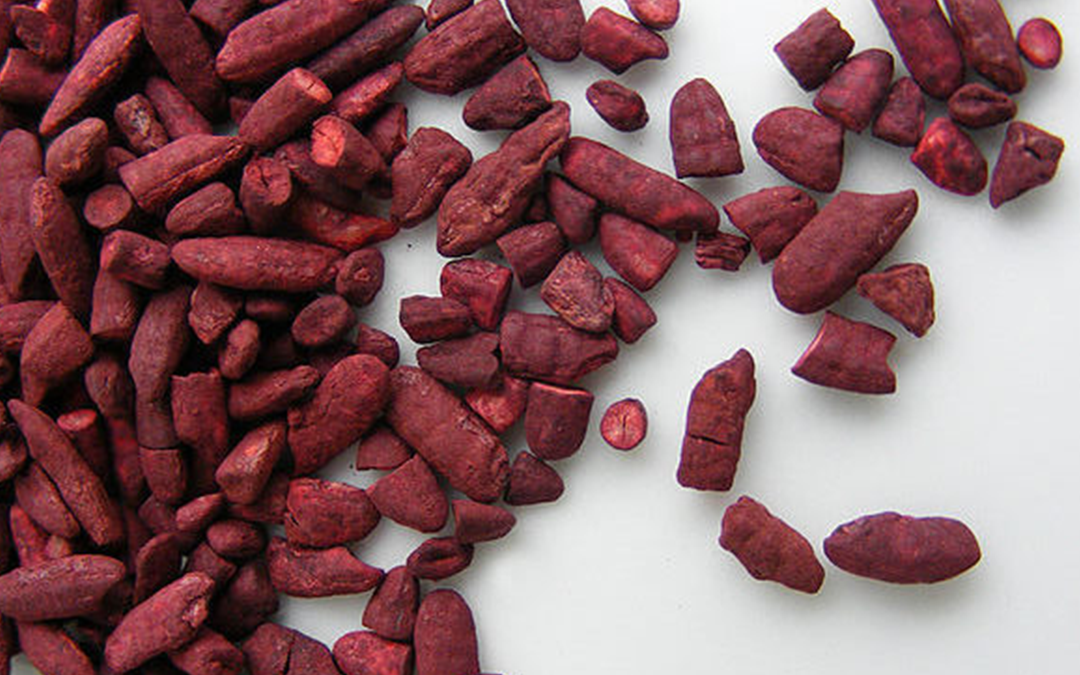Have you heard of red yeast rice? Made by culturing rice with strains of yeast, red yeast rice has been used in Chinese medicine and cooking for over 1,000 years. Because it contains cholesterol-lowering substances called monacolins—most notably monacolin K, which has the same chemical structure as the prescription drug lovastatin—red yeast rice is often used as a supplement. According to USA Today, sales of this product topped $40 million in 2014. But does red yeast rice really work as a natural statin? Let’s examine the evidence.
What’s wrong with prescription statins?
First off, why would someone take red yeast rice instead of medication for cholesterol? Aside from those who simply prefer a natural product, many people worry about the potential side effects of prescription statins. The Mayo Clinic says statins have been linked to muscle pain—which 29 percent of people who start statins report experiencing. They are also linked with digestive issues, elevated blood sugar and brain fog. Very rarely, statins may even cause potentially deadly muscle damage and/or liver problems. They also interact with many other prescription drugs. While people may turn to red yeast rice supplements to avoid these side effects, it should be noted that they work in the same way and can therefore cause similar problems.
Does red yeast rice work as a natural statin?
Research suggests red yeast rice is an effective treatment for high cholesterol and other heart problems. In one clinical trial of nearly 5,000 people over 4.5 years, researchers looked at the effects of an extract derived from red yeast rice, Xuezhikang (XZK), on patients who’d had a heart attack within 60 months of enrollment. They found XZK demonstrated efficacy in decreasing cholesterol, recurrent coronary events, and mortality rates compared to placebo. In another, smaller study, 79 patients with high cholesterol were given either a red yeast supplement or placebo for eight weeks. At week eight, those in the red yeast group saw significant reductions in their LDL concentrations, triglycerides, and total cholesterol.
So what’s the catch?
While red yeast rice has been shown to lower cholesterol, the quality of commercial products varies widely. A 2001 analysis of nine Chinese red yeast rice dietary supplements found a wide range of monacolin content, and only one of the products had all 10 of the compounds an effective supplement should include. Seven of the nine products also contained measurable concentrations of citrinin, a byproduct of the fermentation process that’s toxic to the kidneys. And a brand new study published in the European Journal of Preventive Cardiology that examined 28 brands of red yeast rice showed some contained no monacolin K at all, while others had as much as prescription medication. Since the FDA doesn’t allow supplement companies to list potency on product labels, there’s no way to know how much monacolin K is in a given product. The FDA also considers any red yeast rice product with more than a trace of monacolin K an unapproved drug and won’t allow it to be sold, leaving consumers in a bind—the only supplements available are ones that don’t work very well because if they work too well they’re not allowed on the market.
The bottom line? Red yeast rice does work to lower cholesterol, but the only way to precisely control the amount of monacolin K you’re getting is with a prescription statin. If you’re thinking about taking a red yeast rice supplement, the National Center for Complementary and Integrative Health cautions against using it to replace or postpone conventional care. They also advise telling your health care provider about any supplements you may be using, and to be judicious about information found online. (They even offer a handy fact sheet, Evaluating Web-Based Resources, here.)
What can I do instead?
Besides red yeast rice, there are still plenty of drug-free ways to manage your cholesterol and cardiovascular health. As I explain here and here, basic diet changes can make a huge difference when it comes to protecting your heart from heart attack and stroke. Other supplements can also help, such as Omega-3 fatty acids EPA and DHA and plant sterols. Garlic lowers cholesterol, but the dose you need may cause stomach irritation. Niacin also helps, but be sure to get the low-flush type.
Are you getting the nutrients you need for long-term health? Download my Top 10 Supplements For Men PDF to learn about the most critical supplements you need.
Myles Spar, MD, MPH is board certified in Internal Medicine and in Integrative Medicine. As a clinician, teacher and researcher on faculty of two major medical centers, he has led the charge for a more proactive, holistic and personalized approach to care that focuses on cutting edge technology and preventative care. Dr. Spar has been a consultant with the NBA, presented a TEDx Talk, appeared on national television, and been featured in publications such as the Men’s Journal and the Los Angeles Times. He was most recently National Medical Director and Chief Medical Officer of a national medical practice, but is available to consult with individual patients interested in a personalized approach to optimal performance and health.


